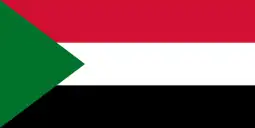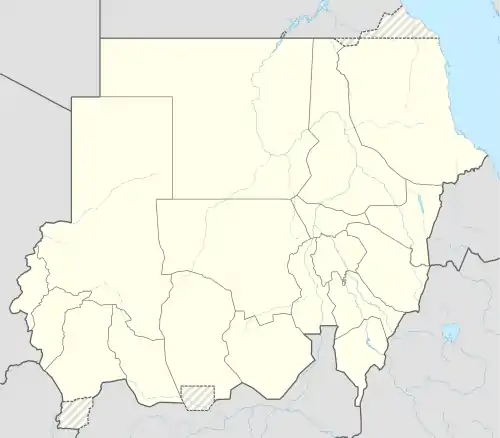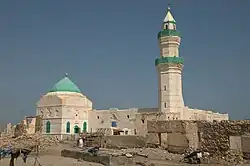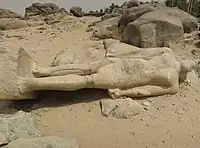


The United Nations Educational, Scientific and Cultural Organization (UNESCO) World Heritage Sites are places of importance to cultural or natural heritage as described in the UNESCO World Heritage Convention, established in 1972.[1] Sudan accepted the convention on June 6, 1974, making its historical sites eligible for inclusion on the list. As of 2023, there are three World Heritage Sites in Sudan.[2]
Location of sites
List of sites
| Name | Image | Location | Criteria | Year | Description |
|---|---|---|---|---|---|
| Gebel Barkal and the Sites of the Napatan Region |  |
Northern | Cultural (i) (ii) (iii) (iv) (vi) | 2003 | These five archaeological sites, stretching over more than 60 km in the Nile valley, are testimony to the Napatan (900 to 270 BC) and Meroitic (270 BC to 350 AD) cultures, of the second kingdom of Kush. Tombs, with and without pyramids, temples, living complexes and palaces, are to be found on the site. Since Antiquity, the hill of Gebel Barkal has been strongly associated with religious traditions and folklore. The largest temples are still considered by the local people as sacred places.[3] |
| Archaeological Sites of the Island of Meroe |  |
River Nile | Cultural (ii) (iii) (iv) (v) | 2011 | The Archaeological Sites of the Island of Meroe, a semi-desert landscape between the Nile and Atbara rivers, was the heartland of the Kingdom of Kush, a major power from the 8th century B.C. to the 4th century A.D. The property consists of the royal city of the Kushite kings at Meroe, near the River Nile, the nearby religious site of Naqa and Musawwarat es Sufra. It was the seat of the rulers who occupied Egypt for close to a century and features, among other vestiges, pyramids, temples and domestic buildings as well as major installations connected to water management. Their vast empire extended from the Mediterranean to the heart of Africa, and the property testifies to the exchange between the art, architectures, religions and languages of both regions.[4] |
| Sanganeb Marine National Park and Dungonab Bay – Mukkawar Island Marine National Park |  |
Red Sea | Natural (vii) (ix) (x) | 2016 | The property consists of two separate areas: Sanganeb is an isolated, coral reef structure in the central Red Sea and the only atoll, 25 km off the shoreline of Sudan. The second component of the property is made up of Dungonab Bay and Mukkawar Island, situated 125 km north of Port Sudan. It includes a highly diverse system of coral reefs, mangroves, seagrass beds, beaches and islets. The site provides a habitat for populations of seabirds, marine mammals, fish, sharks, turtles and manta rays. Dungonab Bay also has a globally significant population of dugongs.[5] |
Tentative List
References
- ↑ "The World Heritage Convention". UNESCO. Retrieved December 21, 2023.
- ↑ "Sudan". UNESCO. Retrieved November 20, 2023.
- ↑ "Gebel Barkal and the Sites of the Napatan Region". UNESCO World Heritage Centre. Retrieved 2023-11-20.
 Text was copied from this source, which is available under a Creative Commons Attribution 3.0 IGO (CC BY 3.0 IGO) license.
Text was copied from this source, which is available under a Creative Commons Attribution 3.0 IGO (CC BY 3.0 IGO) license. - ↑ "Archaeological Sites of the Island of Meroe". UNESCO World Heritage Centre. Retrieved 2023-11-20.
 Text was copied from this source, which is available under a Creative Commons Attribution 3.0 IGO (CC BY 3.0 IGO) license.
Text was copied from this source, which is available under a Creative Commons Attribution 3.0 IGO (CC BY 3.0 IGO) license. - ↑ "Sanganeb Marine National Park and Dungonab Bay – Mukkawar Island Marine National Park". UNESCO World Heritage Centre. Retrieved 2023-11-20.
 Text was copied from this source, which is available under a Creative Commons Attribution 3.0 IGO (CC BY 3.0 IGO) license.
Text was copied from this source, which is available under a Creative Commons Attribution 3.0 IGO (CC BY 3.0 IGO) license. - ↑ "Suakin". UNESCO World Heritage Centre. Retrieved 2021-11-20.
- ↑ "Kerma". UNESCO World Heritage Centre. Retrieved 2021-11-20.
- ↑ "Old Dongola". UNESCO World Heritage Centre. Retrieved 2021-11-20.
- ↑ "Wadi Howar National Park". UNESCO World Heritage Centre. Retrieved 2021-11-20.
- ↑ "Dinder National Park". UNESCO World Heritage Centre. Retrieved 2021-11-20.
- ↑ "Jebel Al Dair National Park". UNESCO World Heritage Centre. Retrieved 2021-11-20.
- ↑ "Al Hassania National Park". UNESCO World Heritage Centre. Retrieved 2021-11-20.
- ↑ "Al Radom National Park". UNESCO World Heritage Centre. Retrieved 2021-11-20.
- ↑ "Jebel Marra / Deriba Caldera (crater lake)". UNESCO World Heritage Centre. Retrieved 2021-11-20.
- ↑ "The Monuments of the Kingdom of Kerma and Dokki Geil". UNESCO World Heritage Centre. Retrieved 2021-11-20.
- ↑ "Sai Island". UNESCO World Heritage Centre. Retrieved 2021-11-20.
- ↑ "The Temple of Soleb". UNESCO World Heritage Centre. Retrieved 2021-11-20.
- ↑ "Banganarti". UNESCO World Heritage Centre. Retrieved 2021-11-20.
- ↑ "Al Khandaq Village". UNESCO World Heritage Centre. Retrieved 2021-11-20.
- ↑ "Wadi Hower National Park - Gala Abou Ahmed (mixed natural and cultural site)". UNESCO World Heritage Centre. Retrieved 2021-11-20.
This article is issued from Wikipedia. The text is licensed under Creative Commons - Attribution - Sharealike. Additional terms may apply for the media files.









.jpg.webp)
